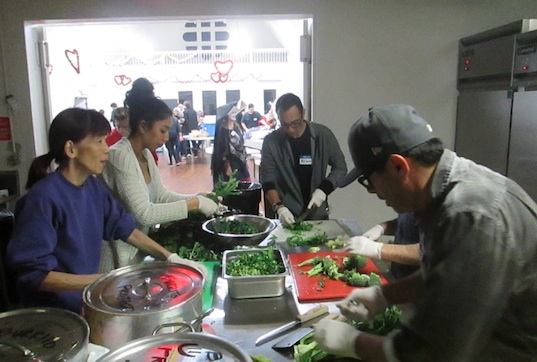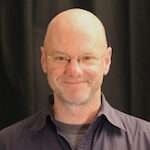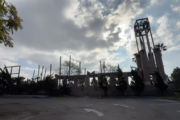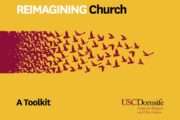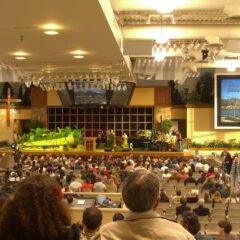On a recent Thursday night, a group of about 75 volunteers for the Burrito Project commandeered the kitchen and fellowship hall at the Church of the Epiphany to make 1,000 burritos to distribute to the homeless on L.A.’s Skid Row. That undertaking was laudable enough, but the Burrito Project’s founder has a broader vision for the movement that he has sparked.
“The biggest thing is to inspire people to find the need in their community and start a project of their own,” said Alan Pinel, an architect, dance instructor and musician who organized the Burrito Project seven years ago. “I want them to become autonomous, then inspire others.”
According to Pinel, the propagation of the Burrito Project’s organizational DNA has already begun. In addition to the initiative that has taken root in Lincoln Heights, there are smaller but growing projects in Downtown L.A., Long Beach, Santa Monica, and Bakersfield.
In this way, the Church of the Epiphany—an outpost of a declining mainline Protestant denomination as well as a storied locale in L.A.’s Chicano history—has become an incubator for one of the movements that will likely shape the city’s religious future. Some of the most prominent features of this just-over-the-horizon landscape are ongoing service-oriented events like the Burrito Project that are geared to attract people from a variety of faiths along with those who profess no particular faith at all.
Pinel, for example, described himself as “traditionally Catholic,” but the mix of religious affiliations and non-affiliations among the volunteers at the event was impressively eclectic.
“I wouldn’t consider myself religious, but I do yoga once in a while,” said Frank Chen, 26, who began volunteering with fraternity brothers when he was in college.
Maria, another 20-something volunteer, also said that she doesn’t count herself as part of any religious tradition—though, “When you grow up in a Mexican family you’re technically Catholic.”
Several others were religious “nones,” but I also spoke to a member of the LDS Church, an evangelical Christian and several mainline Protestants.
The service-oriented spiritual diversity of the Burrito Project is striking, but it is by no means unique. Similar groups like Laundry Love, Monday Night Mission and Share-A-Meal have begun to flourish just as the rising number of religiously disaffiliated Millennials has started to attract attention from scholars and journalists.
“Why food?” asked Courtney Bender, a professor of religion at Columbia University. “There’s something very elemental about making and sharing food that looks like deep religious practices. Why are all these young people who are otherwise not doing anything religious making this elemental practice a central piece of their lives?”
Bender, whose book Heaven’s Kitchen: Living Religion at God’s Love We Deliverchronicles a service group that emerged at the height of the AIDS epidemic, sees a historical “space of critique” stretching from contemporary organizations like the Burrito Project to God’s Love We Deliver in the 1980s to Social Gospel activists in the early 20th century. She said that the groups that occupy such a space often have religious origins but are very reluctant to push those identities, both for practical reasons and as a way of critiquing the larger relationships among politics, service and spirituality.
“God’s Love was started by a woman with a strong spiritual calling,” Bender said. “But churches weren’t doing anything for people with AIDS. So in that crisis moment, they said who cares what religion you are? Come over here and let’s feed these people. Our message is the food that we give.”
Following a decade of headlines about the growth of religious “nones,” recent surveys from Pew have shown that religion is losing its influence in American public life, and that most of the American public believes this loss of influence is an ominous development.
But religious disaffiliation is a liability for civil society only if we assume that the impulse toward compassion and selfless service—the primary social goods that are usually associated with religious traditions—is lost when people leave institutional forms of religion. The dramatic growth of service groups that are attracting religious “nones” suggests that while the altruistic impulse may be specially honored in many religions, it isn’t unique to any of them, or to the phenomenon of religion itself.
Far from sounding the death knell of the spirit of civic-mindedness that marked the heyday of institutions like the Church of the Epiphany, “nones”-friendly service groups are arguably charting a course for religious innovation. The primary guideposts marking this path: Determine the needs of the most marginalized residents of your city, welcome all comers in finding volunteers to meet those needs and make this commitment to open-hearted service the organizing principle of your religious community.
Service-oriented “nones” are offering the religious institutions they have abandoned a good reminder of what religion is really supposed to be about.
Nick Street was a senior writer with the USC Center for Religion and Civic Culture.
